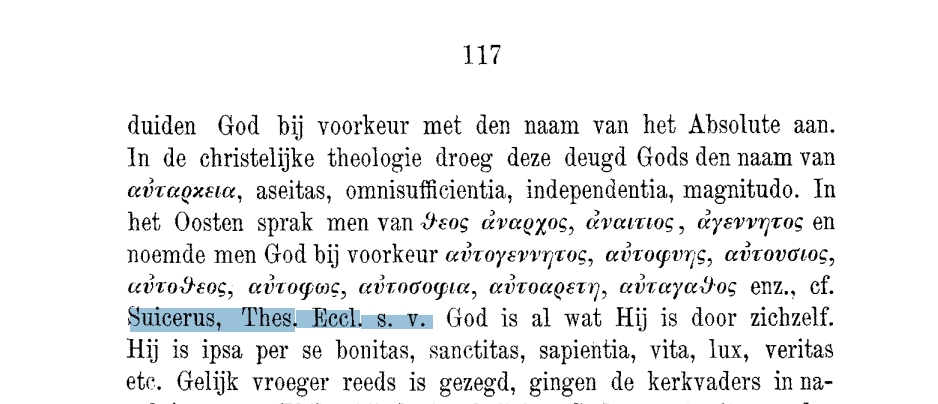A scene from The Canterbury Psalter (12th century)
Blog
Auto-
In Bavinck’s RD II:151, while talking about divine independence, he gives a wonderful list of Greek terms that develop divine independence by putting the prefix auto- onto a divine attribute: autogennetos, autophues, autousios, autotheos, autophos, and so on. It’s fantastic: a richer catalog than I’ve found in any single Greek patristic source –not even in Pseudo-Dionysius and John of Damascus put together– it seems to be gathered from several.
Look for the list in this screencap, down beside the little grabby hand:

Notice that the list is in quotation marks. The footnote says “Cf. J.C. Suicerus, Thesaurus ecclesiasticus, s.v. ‘αὐταρκεία.'” So that must be the list maker, the person who trawled through Greek patristic texts and gathered in this wonderful usage. Sounds like a guy I’d like to party with, so let’s look him up!
“Suicerus” is Johann Caspar Suicer (that is, Schweitzer: PRDL page here). A Swiss Reformed pastor and scholar, 1620-1684, his Thesaurus Ecclesiasticus was an especially valuable tool cited several times by Bavinck; you also see it used in many older NT commentaries. So I s.v. ‘αὐταρκεία,’ that is, turn in his Thesaurus to the entry (sub verbo, under the word) for αὐταρκεία. But it doesn’t have anything like the sentence I’m after. The entry is rich, but it’s mostly about the virtue of contentment. That’s a great, classical sense of autarkeia, but it hardly gets me to the divine attribute I’m after, never mind the wonderful catalog of of auto- compounds I came here for.

Looking around Suicer, though, I see that autarkeia is just the first auto-entry, and that the Thesaurus includes about 16 columns of auto-words: about 45 words are treated! More on that in a minute. First, it occurs to me that Bavinck’s footnote is pretty bad, so on a hunch I check the Dutch:

Sure enough, Bavinck’s Dutch just says s.v., which I suppose could signify not just “under this word” but “under all these words.” After all, it doesn’t say “s.v. autarkeia” (as the ET does), just “s.v.” Also, there are no quotation marks, so I have no reason to expect I’ll find the “quoted” sentence in Suicer.
So I look under all those words: 45 auto-compounds, which take wonderful nouns like righteousness, wisdom, light, power, essence, holiness, life, and so on, and direct them to God: God is auto- all those things; God is ipse those things; per se all of them. “All that God is, He is of himself.” All of Suicer’s entries provide a definition and point to where they can be found in Greek patristic usage: Athanasius, Dionysius, Gregory Nazianzen, Chrysostom, and so on. Reading a Latin thesaurus of Greek terms is slow going, some of the Greek ligatures will break your heart, and the page numbers never match available editions (this all predates Migne), but there’s solid gold in almost every entry. Look at Self-Holy, Self-Invincible, and Self-True:

And if you’re into this kind of thing, you’ll want to peruse Suicer’s entry on autotheos:

In my opinion, the occasional ascription of autotheos to the Son of God by people like Calvin makes a lot more sense when you recognize that autotheos belongs in the vast array of auto-compounds that inform the Greek patristic doctrine of God.
But there are lots of other reasons why the auto-compounds are theologically important. They are a way of referring all the divine attributes back to God as the source and measure of them all.
About This Blog

Fred Sanders is a theologian who tried to specialize in the doctrine of the Trinity, but found that everything in Christian life and thought is connected to the triune God.


